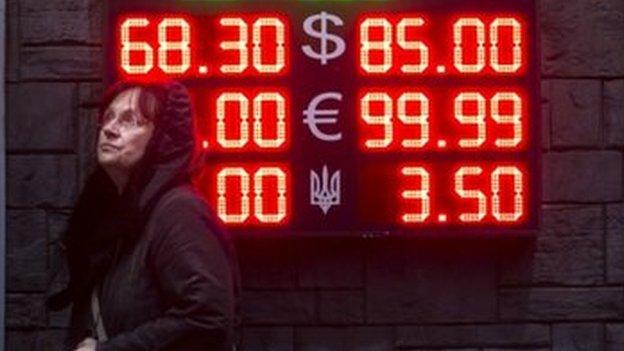Russia's economic turmoil: Nightmare or opportunity?
- Published
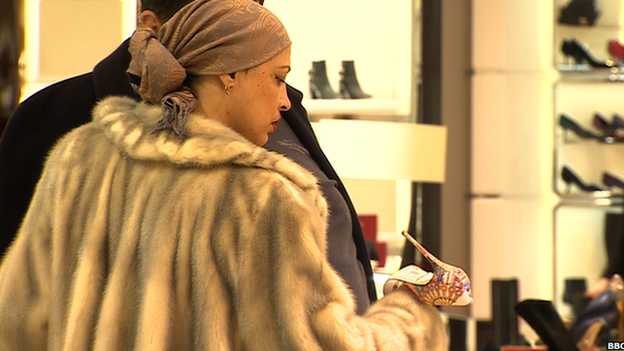
Moscow's top department stores are not short of customers despite the grim economic outlook
The Russian economy is in turmoil - Western sanctions over Ukraine, the fall in oil and gas prices and a tumbling currency have all contributed to a dire outlook. But what impact are people on the ground feeling?
Moscow and the IMF agree that the Russian economy will shrink by 3% this year.
For some, though, the crisis brings new opportunities.
In Bryansk, 400km (249 miles) south-west of Moscow, young cows are being herded by ranchers on horseback.
The 7,000 cattle represent just a fraction of a huge new cattle-breeding venture, involving tens of thousands of animals sprawled across farmland the size of England.
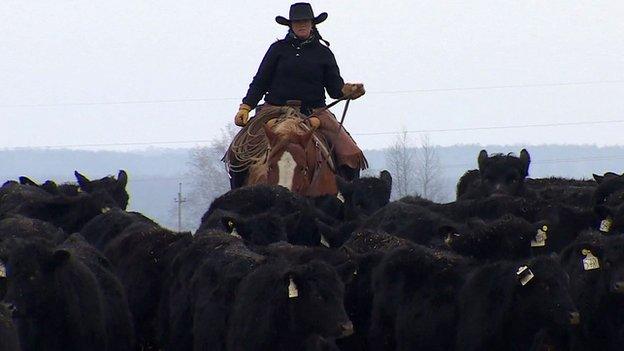
A rancher with some of Miratorg's Angus cattle
Alexander Linnik and his brother Viktor were already the country's biggest pork producers when their firm, Miratorg, started breeding prime Aberdeen Angus beef cattle (imported from Australia and the US) in 2010. It is now the biggest such plant in Russia and Europe.
Last year, the complex was processing 100 head of cattle per day. Next year, the company says it will process up to 1,000.
But such rapid growth would have been impossible without Western sanctions - Moscow's counter-sanctions shut off Russia's domestic market to foreign food exporters, eliminating much of the competition.
Then the rouble crashed, making meat very cheap to export.
"We need the rouble to stay cheap for our exports - so the sanctions have been useful," says Linnik.
The BBC's Oleg Boldyrev meets the winners of Russia's troubled economy
But Linnik is keen to avoid the impression that his company relies on luck. "We've invested a lot in these past eight years, and had government backing," he says.
Linnik admits that a tough economic climate may dampen the domestic appetite for prime beef, but with the rouble so cheap he hopes the government can help them tap into European markets.
"The sanctions were possibly even more useful for the government, to understand we need to export food," he says. "We have the technology and quality which makes our products a match for, or even better than, anything similar from Europe."
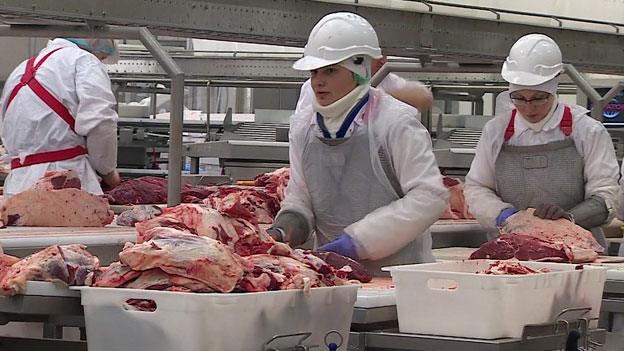
Last year Miratorg processed 100 head of cattle per day - they expect the figure to rise to 1,000 this year
What's been bad news for Russia has been good news for the Linnik brothers, but others are feeling the pain.
Tatyana Volkova is adjusting to a harder life. The single mother lives with her son and daughter, both under 10, in a wooden bungalow provided by the state in Berezniki, a small village outside Yaroslavl.
The local authorities stopped free school dinners last year as part of cuts to social spending and now she, like many other parents, is struggling to find the money to feed them.
"For me it is a nightmare - wage cuts, job cuts," she says. "The government is happy to send aid to the people of Ukraine. But when we ordinary Russians are at our most desperate, we are disowned. It's offensive."
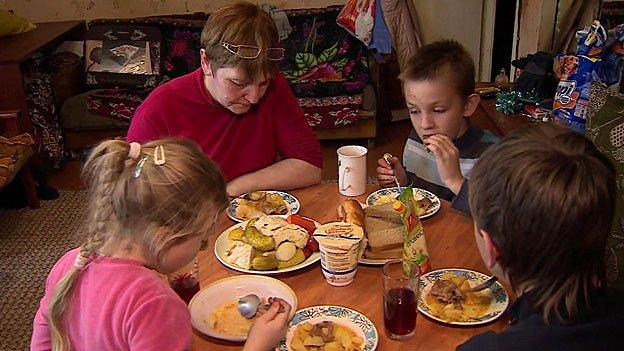
Single mother Tatyana Volkova struggles now the children no longer get free school meals
"We survive thanks to our garden. We have potatoes and some other vegetables left. Sometimes I go fishing. I give the best I can to my kids, and I hope they won't notice this economic crisis," Volkova says.
"But there is no spare money at all. I can't even buy any toys for my kids. Before any visit to a shop I have to calculate the possible expenses in order to stay within our family budget. I have just lost my job and now I am struggling to find a new one. Life is not easy for us at all."
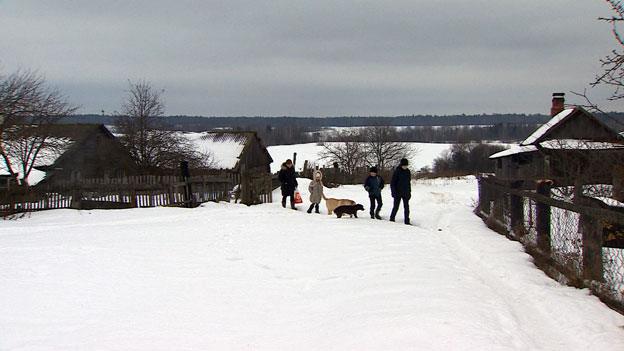
Tatyana Volkova walks her children to school in the snow; if they are lucky, a school bus collects them
Meanwhile, walking around the centre of Yaroslavl itself, a provincial middle-class city in the heart of Russia, you can hardly tell there is an economic crisis. Shops and market stalls are open, lights are on. People are busy, rushing up and down the streets.
When you scratch below the surface, however, local residents tell a different story.
People are already feeling the consequences of the falling rouble. The prices of some goods are up 150%, and there are warnings the inflation rate may rise to 20% by spring.
"Every rouble matters when you need to save money," says 79-year-old Valentina Golenkina.
"I buy meat only on big holidays," says Valentina Golenkina
Every day she goes out to hunt for the cheapest produce and medicine. "I walk 40-50 minutes on foot to get to this trade centre, because there is a particularly cheap pharmacy here," she says. "I haven't bought any fruit this year, and I buy meat only on big holidays."
Two-thirds of her pension goes on household bills and medicine, so she has less than $2 (£1.3) a day left for food. She has no husband or children to help, either.
Golenkina says she misses the old days. "I want the Communist Party to return to power. There was more justice then. Those who worked properly always lived well in the USSR, and this rule does not work now," she says. "I worked all of my life at the factory, and I hoped to live normally as a pensioner, but now I have to struggle."
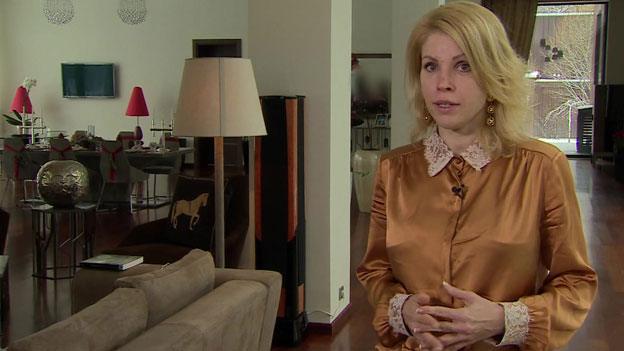
Estate agent Elena Yurgeneva says Moscow's rich "are not in the mood for shopping"
For Russia's rich, while there is still plenty of money to go around, there are a few subtle changes being noticed by estate agents.
Elena Yurgeneva, sales director at Knight Frank, says luxury property deals are taking longer to complete. "A significant number of buyers at the high end segment of the market are oil businessmen, and they are not in the mood for shopping," she says.
She is standing in the spacious dining hall of a mansion in the prestigious western suburbs of Moscow that has been on the market for years. The property owner has dropped his asking price from $35m (£23m) to $19m (£13m).
She says people aren't nervous about the economy, though. "It's just not the right time to buy."

The 'losers' story and the 'winners' story on the BBC World Service.
For more on the BBC's A Richer World, go to www.bbc.com/richerworld - or join the discussion on Twitter using the hashtag #BBCRicherWorld, external
- Published28 January 2015
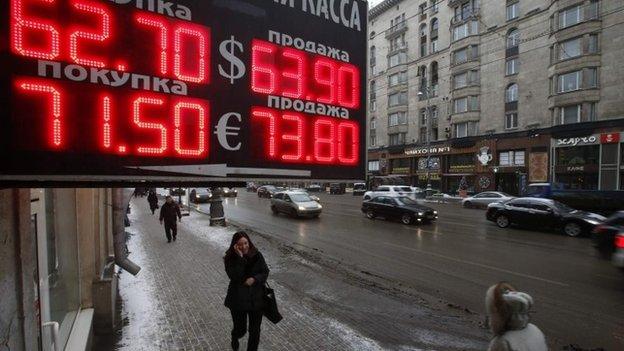
- Published17 December 2014
